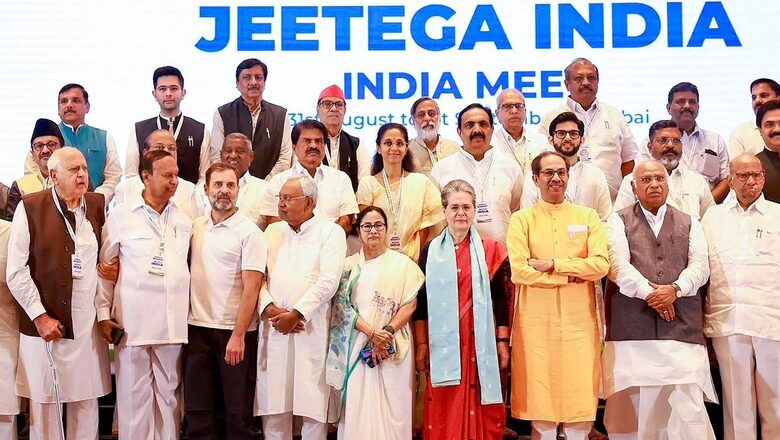
views
In a surprising move, the Opposition alliance, aptly named INDIA, has declared one of its initial decisions: a boycott of approximately 14 prominent TV anchors. Their rationale behind this action stems from their belief that these anchors host prime-time shows that propagate messages of hatred. The tussle between the political establishment and the media is far from novel, and it’s essential to recognise that such attempts to curtail the media’s role do not align with democratic principles. While there’s no room for support when it comes to those who promote hate, attempting to vilify a segment of the media through a boycott is a questionable approach.
Dangerous Precedent
If the Opposition alliance, including the Congress, seeks to convince the public that the Indian media has always maintained complete impartiality, they may be leading people down a misleading path. In the ever-evolving landscape of global media, India’s own media industry has experienced a multitude of transformations over the past decade. In today’s media landscape, the once-clear demarcation between opinion and news has become increasingly hazy. The distinction that was once a guiding principle for journalists and readers alike has been muddled, leaving us to navigate a complex web of information where objectivity is often overshadowed by subjectivity.
Gone are the days when news outlets were expected to provide unbiased reporting, presenting facts devoid of personal perspectives or biases. In this era of sensationalism, digital media dominance, and the ever-expanding online landscape, it is undeniable that the way we consume news and opinions has undergone a profound transformation. The advent of personalised content has revolutionised the way information is disseminated and received. In the ever-evolving landscape of media, the very essence of what it means to be a journalist has undergone a profound transformation.
In the current landscape of public discourse, there is an undeniable need to confront the issue of holding individuals, institutions, or media segments responsible for disseminating messages of hatred. It’s vital to scrutinise cases where deliberate attempts have been made to foster divisions and animosity within society. However, painting a narrative that insinuates the Opposition alliance’s primary agenda, revolving around targeting a particular section of the media, is not just fraught with danger but also establishes an unsettling precedent.
Wrong Messaging
It is crucial to understand that the Opposition alliance’s strategy might be ineffective, primarily because of its messaging approach. There are tactful ways to address concerns, and it’s essential to acknowledge that various political parties, both past and present, have, at times, chosen to boycott media organisations, anchors, or newspapers. It would be inaccurate to claim that the ruling party has never engaged in disputes with media outlets. In reality, virtually every political organisation in India has, on occasion, benefited from media biases.
The Opposition alliance’s unequivocal message that they intend to boycott media critical of their views raises concerns about the principles of democracy. Opposition parties should also be cautious because instances of state dispensations targeting journalists have occurred in states under their rule. This phenomenon spans from West Bengal to Punjab, Rajasthan, and beyond. Many media outlets face government scrutiny, regardless of the political party in power, if they report unfavourably about them. Journalists and editors in India, especially those working for vernacular news organisations, endure persistent harassment.
Opposition parties could have taken a subtler approach, such as refraining from participating in media debates hosted by certain anchors. It’s widely known that many political parties have unofficially adhered to such policies against specific channels, programmes, or anchors long before any official announcements. In a time of heightened polarisation, the nuances of messaging are crucial. An attempt to convey strong messaging through misguided means can ultimately prove counterproductive.
Opposition’s Politics of Convenience
Since Narendra Modi took office as India’s Prime Minister in 2014, a persistent chorus from the Congress and left-leaning circles has claimed that democratic values in India are eroding under the rule of the Bharatiya Janata Party (BJP). The government finds itself under the relentless scrutiny of Opposition parties, who vehemently argue that it suppresses the expression of dissenting opinions. Frequently travelling abroad, senior Congress leader Rahul Gandhi attacks the BJP government as being undemocratic.
In the midst of the Opposition political parties’ declaration to boycott a certain segment of the media, a pressing inquiry arises: Does this course of action adhere to the fundamental tenets of democracy? In the realm of political discourse, a pressing question looms large: Does the act of boycotting certain media outlets amount to a curtailment of the cherished principles of free speech and expression?
This inquiry demands the attention of the Opposition as they grapple with the implications of their actions. In the realm of political discourse, a pressing matter beckons the attention of the Opposition: The critical examination of their stance on championing the fundamental principles of freedom of speech and expression. A pertinent question arises: Can this noble cause be subject to selectivity, contingent upon one’s convenience?
In contemplating the matter at hand, it becomes imperative for the Opposition to engage in introspection regarding their stance on the preservation of democratic principles. Should the burden of upholding these values rest solely on the ruling regime, or is it incumbent upon the Opposition to demonstrate an unwavering dedication to this cause as well?
Unsettled Priorities
The Opposition alliance’s decision to prioritise the boycott of specific news anchors as one of its initial actions exposes a lack of cohesion in their priorities. It is increasingly evident that all is not well within the alliance itself. State units of the Congress party in Delhi, Punjab, and West Bengal have expressed reservations about aligning with the AAP (in Delhi) and the Trinamool Congress (in Bengal). Meanwhile, the Communist Party of India (Marxist) has firmly stated its refusal to engage in seat-sharing discussions in Bengal and Kerala. Despite Bihar’s Chief Minister Nitish Kumar initially playing a central role in the alliance, he has been sidelined, leaving the alliance without a clear direction.
Crucially, none of the critical electoral issues have been discussed and settled within the alliance’s meetings. In the midst of these uncertainties, what the Opposition parties are projecting is a sense of insecurity.
It’s imperative to emphasise that in a democracy, criticism should always be welcome. If the media is stifled, it poses a threat to the democratic fabric. However, it’s essential to clarify that this doesn’t imply endorsing or supporting hate speech. If the Opposition has concerns about specific anchors, channels, or shows, legal avenues are available. There are democratic means of protest besides boycotting, which should not be a prime political strategy as it contradicts democratic principles.
The author is a visiting faculty of journalism, a political columnist, and a doctoral research scholar. He tweets at @sayantan_gh. Views expressed in the above piece are personal and solely that of the author. They do not necessarily reflect News18’s views.

















Comments
0 comment